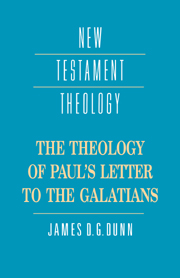Book contents
- Frontmatter
- Contents
- Editor's preface
- Preface
- List of abbreviations
- 1 Introduction
- 2 The make or break issues
- 3 The fundamental agreements
- 4 The heritage of Abraham
- 5 How should the heirs of Abraham live?
- 6 Lesser issues
- 7 The influence of Galatians in Christian thought
- List of further reading
- Index of references
- Index of names
- Index of subjects
3 - The fundamental agreements
Published online by Cambridge University Press: 05 June 2012
- Frontmatter
- Contents
- Editor's preface
- Preface
- List of abbreviations
- 1 Introduction
- 2 The make or break issues
- 3 The fundamental agreements
- 4 The heritage of Abraham
- 5 How should the heirs of Abraham live?
- 6 Lesser issues
- 7 The influence of Galatians in Christian thought
- List of further reading
- Index of references
- Index of names
- Index of subjects
Summary
A major problem in writing on the theology of a single document is whether the document is to be read as a statement of theology sufficiently complete in itself or as a witness to a fuller theology which is presumed to lie behind it. On the first alternative, commentators may be hopeful that their reconstructions of the document's theology will properly reflect the emphases of the document itself. But they will be bound to leave many questions unanswered, where features are unclear, including presumably, allusions or echoes which can be neither identified not illuminated from the text itself. On the second alternative, there is an equal danger that the real focus of interest will become the fuller theology lying behind the document and that the distinctive features of the document's own emphases will be lost sight of or too readily discounted.
In this case we can surely presume that a larger theology of Paul does indeed lie behind Galatians. The theology of Galatians is like a basin of water drawn from a larger cistern. It can be taken for granted, in other words, that in Galatians Paul neither wrote everything he could have written on any subject, nor attempted to write on every appropriate subject. And of course, behind Paul there is a larger theology again – that of the first Christians, in all its diversity. And behind them again the theologies of the wider Judaisms of the time, to go no further.
- Type
- Chapter
- Information
- The Theology of Paul's Letter to the Galatians , pp. 34 - 63Publisher: Cambridge University PressPrint publication year: 1993



